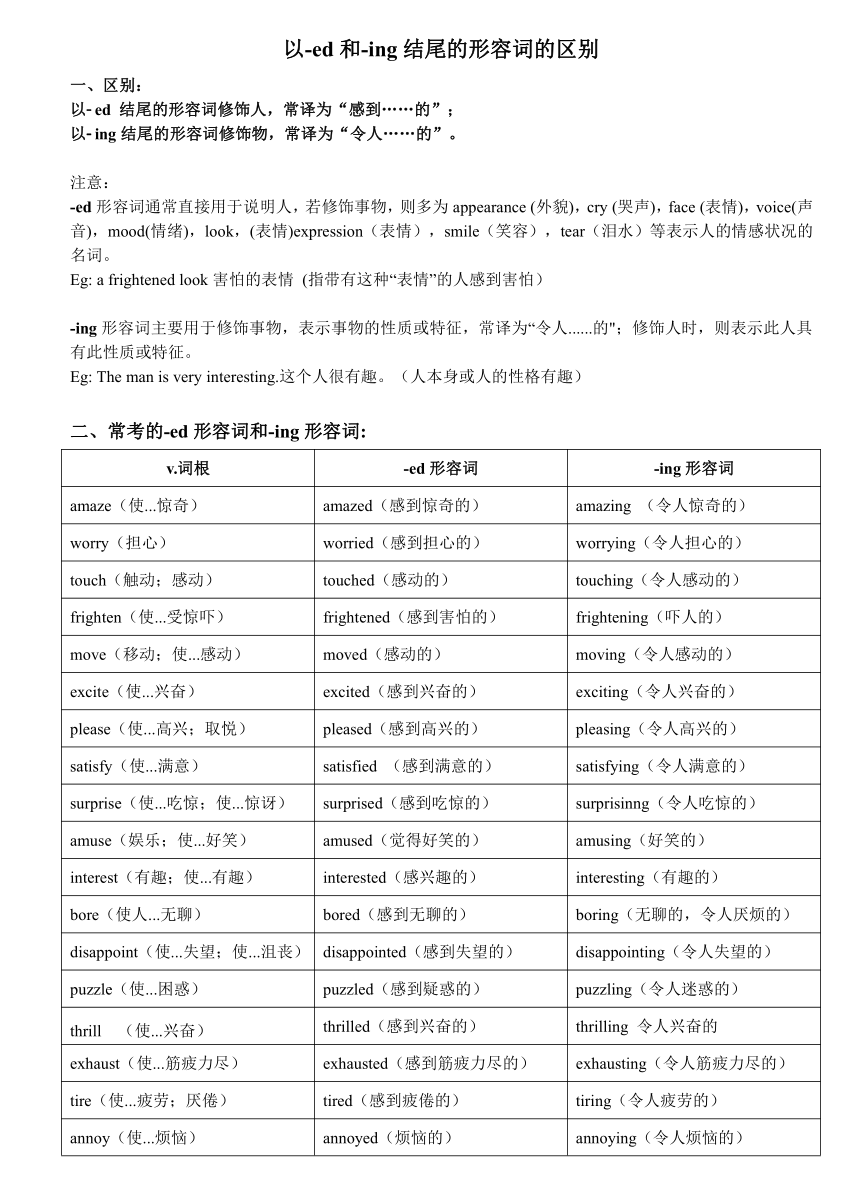2025届高三英语一轮复习 语法填空必考点之-ed和-ing结尾的形容词的区别(讲义)
文档属性
| 名称 | 2025届高三英语一轮复习 语法填空必考点之-ed和-ing结尾的形容词的区别(讲义) |

|
|
| 格式 | docx | ||
| 文件大小 | 25.5KB | ||
| 资源类型 | 教案 | ||
| 版本资源 | 人教版(2019) | ||
| 科目 | 英语 | ||
| 更新时间 | 2024-11-13 00:00:00 | ||
图片预览

文档简介
以-ed和-ing结尾的形容词的区别
一、区别:
以 ed 结尾的形容词修饰人,常译为“感到……的”;
以 ing结尾的形容词修饰物,常译为“令人……的”。
注意:
-ed形容词通常直接用于说明人,若修饰事物,则多为appearance (外貌),cry (哭声),face (表情),voice(声音),mood(情绪),look,(表情)expression(表情),smile(笑容),tear(泪水)等表示人的情感状况的名词。
Eg: a frightened look 害怕的表情 (指带有这种“表情”的人感到害怕)
-ing形容词主要用于修饰事物,表示事物的性质或特征,常译为“令人......的";修饰人时,则表示此人具有此性质或特征。
Eg: The man is very interesting.这个人很有趣。(人本身或人的性格有趣)
二、常考的-ed形容词和-ing形容词:
v.词根 -ed形容词 -ing形容词
amaze(使...惊奇) amazed(感到惊奇的) amazing (令人惊奇的)
worry(担心) worried(感到担心的) worrying(令人担心的)
touch(触动;感动) touched(感动的) touching(令人感动的)
frighten(使...受惊吓) frightened(感到害怕的) frightening(吓人的)
move(移动;使...感动) moved(感动的) moving(令人感动的)
excite(使...兴奋) excited(感到兴奋的) exciting(令人兴奋的)
please(使...高兴;取悦) pleased(感到高兴的) pleasing(令人高兴的)
satisfy(使...满意) satisfied (感到满意的) satisfying(令人满意的)
surprise(使...吃惊;使...惊讶) surprised(感到吃惊的) surprisinng(令人吃惊的)
amuse(娱乐;使...好笑) amused(觉得好笑的) amusing(好笑的)
interest(有趣;使...有趣) interested(感兴趣的) interesting(有趣的)
bore(使人...无聊) bored(感到无聊的) boring(无聊的,令人厌烦的)
disappoint(使...失望;使...沮丧) disappointed(感到失望的) disappointing(令人失望的)
puzzle(使...困惑) puzzled(感到疑惑的) puzzling(令人迷惑的)
thrill (使...兴奋) thrilled(感到兴奋的) thrilling 令人兴奋的
exhaust(使...筋疲力尽) exhausted(感到筋疲力尽的) exhausting(令人筋疲力尽的)
tire(使...疲劳;厌倦) tired(感到疲倦的) tiring(令人疲劳的)
annoy(使...烦恼) annoyed(烦恼的) annoying(令人烦恼的)
astonish(使...惊奇) astonished(感到惊奇的) astonishing(令人惊奇的)
confuse(使...困惑) confused(迷惑不解的) confusing(令人不解的)
embarrass(使...尴尬) embarrassed(感到尴尬的) embarrassing(令人尴尬的)
inspire(鼓舞;激励;给予...灵感) inspired(受到鼓舞的) inspiring(令人鼓舞的)
shock(使...震惊) shocked(感到震惊的) shocking(令人震惊的)
terrify(使...恐怖) terrified(感到害怕的) terrifying(令人恐怖的)
depress (使...沮丧) depressed (沮丧的;萧条的) depressing(令人沮丧的)
disgust v.使...厌恶;厌烦 disgusted(厌恶的;厌烦的) disgusting(令人厌恶的)
fascinate v.使...着迷 fascinated (着迷的) fascinating (迷人的)
frustrate v.使...失望 frustrated (感到失望的) frustrating(令人失望的)
entertain v.使...愉快;娱乐 entertained (感到愉快的) entertaining (愉快的,有趣的)
disturb v.打扰;干扰 disturbed (受到干扰的) disturbing (烦人的)
discourage v.使泄气;使灰心 discouraged (泄气的;心灰意冷的) Discouraging (使人沮丧的)
三、练习:
Seeing the result, we are all .(disappoint).
The (surprise) look on his face suggested that he hadn’t expected that.
Tom sounds very (interest) in the job, but I’m not sure whether he can do it well.
She was because her idol wasn’t there. She thought it was really . (disappoint)
The movie was and I was completely by this movie.(bore)
The story was and I was deeply by this movie.(move)
The policeman’s traffic directions made all the drivers quite .(confuse)
The situation is more than ever. I’m about what to do.(puzzle)
The look on the boy’s face suggested that he was at the news.(frighten)
10.I was deeply_________by your _________words.(move)
11.His words were ___________,which made many people ___________. (discourage)
12.The news was _________and we were _________the whole night.(excite)
13. I’m __________ in the ___________people. (interest)
14.He was ___________ about his __________ son.(worry)
15.The man standing there was ___________(scare), not daring to say a word.
16. The man standing there looks __________, and the little boy is ___________.(frighten)
17.There was a __________(frighten) look on the girl's face when she saw the ____________(thrill) film.
18. Everyone looked at her with _________(please) smiles.
19. When the police told her son was saved, she was grateful and ________(move) tears flooded into her eyes.
20.We were very____________(shock)when we heard the _______________ (shock) news.
21.The tiger looked very _____________(frighten) , but Li Ping wasn’t ___________(frighten).
22.Mr. Smith, _____________(tire) of the___________( bore )speech, started to read a novel.
一、区别:
以 ed 结尾的形容词修饰人,常译为“感到……的”;
以 ing结尾的形容词修饰物,常译为“令人……的”。
注意:
-ed形容词通常直接用于说明人,若修饰事物,则多为appearance (外貌),cry (哭声),face (表情),voice(声音),mood(情绪),look,(表情)expression(表情),smile(笑容),tear(泪水)等表示人的情感状况的名词。
Eg: a frightened look 害怕的表情 (指带有这种“表情”的人感到害怕)
-ing形容词主要用于修饰事物,表示事物的性质或特征,常译为“令人......的";修饰人时,则表示此人具有此性质或特征。
Eg: The man is very interesting.这个人很有趣。(人本身或人的性格有趣)
二、常考的-ed形容词和-ing形容词:
v.词根 -ed形容词 -ing形容词
amaze(使...惊奇) amazed(感到惊奇的) amazing (令人惊奇的)
worry(担心) worried(感到担心的) worrying(令人担心的)
touch(触动;感动) touched(感动的) touching(令人感动的)
frighten(使...受惊吓) frightened(感到害怕的) frightening(吓人的)
move(移动;使...感动) moved(感动的) moving(令人感动的)
excite(使...兴奋) excited(感到兴奋的) exciting(令人兴奋的)
please(使...高兴;取悦) pleased(感到高兴的) pleasing(令人高兴的)
satisfy(使...满意) satisfied (感到满意的) satisfying(令人满意的)
surprise(使...吃惊;使...惊讶) surprised(感到吃惊的) surprisinng(令人吃惊的)
amuse(娱乐;使...好笑) amused(觉得好笑的) amusing(好笑的)
interest(有趣;使...有趣) interested(感兴趣的) interesting(有趣的)
bore(使人...无聊) bored(感到无聊的) boring(无聊的,令人厌烦的)
disappoint(使...失望;使...沮丧) disappointed(感到失望的) disappointing(令人失望的)
puzzle(使...困惑) puzzled(感到疑惑的) puzzling(令人迷惑的)
thrill (使...兴奋) thrilled(感到兴奋的) thrilling 令人兴奋的
exhaust(使...筋疲力尽) exhausted(感到筋疲力尽的) exhausting(令人筋疲力尽的)
tire(使...疲劳;厌倦) tired(感到疲倦的) tiring(令人疲劳的)
annoy(使...烦恼) annoyed(烦恼的) annoying(令人烦恼的)
astonish(使...惊奇) astonished(感到惊奇的) astonishing(令人惊奇的)
confuse(使...困惑) confused(迷惑不解的) confusing(令人不解的)
embarrass(使...尴尬) embarrassed(感到尴尬的) embarrassing(令人尴尬的)
inspire(鼓舞;激励;给予...灵感) inspired(受到鼓舞的) inspiring(令人鼓舞的)
shock(使...震惊) shocked(感到震惊的) shocking(令人震惊的)
terrify(使...恐怖) terrified(感到害怕的) terrifying(令人恐怖的)
depress (使...沮丧) depressed (沮丧的;萧条的) depressing(令人沮丧的)
disgust v.使...厌恶;厌烦 disgusted(厌恶的;厌烦的) disgusting(令人厌恶的)
fascinate v.使...着迷 fascinated (着迷的) fascinating (迷人的)
frustrate v.使...失望 frustrated (感到失望的) frustrating(令人失望的)
entertain v.使...愉快;娱乐 entertained (感到愉快的) entertaining (愉快的,有趣的)
disturb v.打扰;干扰 disturbed (受到干扰的) disturbing (烦人的)
discourage v.使泄气;使灰心 discouraged (泄气的;心灰意冷的) Discouraging (使人沮丧的)
三、练习:
Seeing the result, we are all .(disappoint).
The (surprise) look on his face suggested that he hadn’t expected that.
Tom sounds very (interest) in the job, but I’m not sure whether he can do it well.
She was because her idol wasn’t there. She thought it was really . (disappoint)
The movie was and I was completely by this movie.(bore)
The story was and I was deeply by this movie.(move)
The policeman’s traffic directions made all the drivers quite .(confuse)
The situation is more than ever. I’m about what to do.(puzzle)
The look on the boy’s face suggested that he was at the news.(frighten)
10.I was deeply_________by your _________words.(move)
11.His words were ___________,which made many people ___________. (discourage)
12.The news was _________and we were _________the whole night.(excite)
13. I’m __________ in the ___________people. (interest)
14.He was ___________ about his __________ son.(worry)
15.The man standing there was ___________(scare), not daring to say a word.
16. The man standing there looks __________, and the little boy is ___________.(frighten)
17.There was a __________(frighten) look on the girl's face when she saw the ____________(thrill) film.
18. Everyone looked at her with _________(please) smiles.
19. When the police told her son was saved, she was grateful and ________(move) tears flooded into her eyes.
20.We were very____________(shock)when we heard the _______________ (shock) news.
21.The tiger looked very _____________(frighten) , but Li Ping wasn’t ___________(frighten).
22.Mr. Smith, _____________(tire) of the___________( bore )speech, started to read a novel.
同课章节目录
